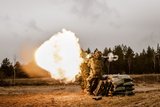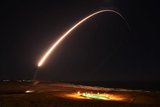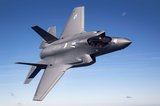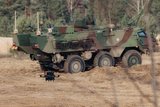EU 'extremely worried' about fate of nuclear treaty
The EU's top diplomat Federica Mogherini said on 20 November she was ‘extremely worried’ about the fate of a major US-Russia nuclear missile control treaty, warning the security of Europe could be at risk.
Last month, Washington announced it was pulling out of the Intermediate-Range Nuclear Forces Treaty (INF) over Russia's deployment of a missile system that Western powers say breaches the 1987 accord.
The Kremlin has fired off warnings of a new arms race, and as she convened a meeting of EU defence ministers Mogherini expressed concern, calling for talks to maintain the agreement.
‘If we go towards the dismantling of this agreement, Europe's security is to be put at risk and we do not want to see European territory go back to being a battlefield for other powers as it has been for so long in the past,’ she told reporters.
‘We don't want to go back to those kind of tensions, to that kind of situation and we still hope there is a space for saving the agreement and implementing it,’ she said.
While US President Donald Trump's administration has signalled it will withdraw from the treaty, it has not taken steps to put the decision into practice.
The INF treaty, signed by then US president Ronald Reagan and Soviet leader Mikhail Gorbachev, ended a nuclear build-up in Europe triggered by Moscow's deployment of SS-20 missiles targeting Western European capitals.
The US and NATO say Russia's 9M729 missile system, also known by the designation SSC-8, breaches the treaty, which prohibits ground-launched missiles with a range of between 500 and 5,500km.
Washington says repeated attempts to persuade Russia to come back into compliance since 2013 have been met with silence or obfuscation.
NATO Secretary General Jens Stoltenberg said Europe should demand 'full and transparent compliance' with the treaty from Russia.
'Russia has developed, tested and also fielded new missiles, SSC-8, for years. These missiles are mobile, hard to detect, nuclear capable and they are putting the INF Treaty in jeopardy,' Stoltenberg said as he arrived to join the EU ministers for talks.
'The US is in full compliance with the INF Treaty, there are no new US missiles in Europe, but there are new Russian missiles in Europe.'
Trump and his Russian counterpart Vladimir Putin discussed the INF treaty during a brief conversation at World War I centenary events in Paris last week.
More from Defence Notes
-
![Taiwan approved for purchase of $11 billion in weapons from US]()
Taiwan approved for purchase of $11 billion in weapons from US
The US State Department’s approval of a multi-billion-dollar sale of weapons to Taiwan includes tactical mission networks equipment, uncrewed aerial systems, artillery rocket systems and self-propelled howitzers as well as anti-tank guided missiles.
-
![US National Security Strategy prioritises advanced military capabilities and national industry]()
US National Security Strategy prioritises advanced military capabilities and national industry
The 2025 NSS has emphasised investment in the US nuclear and air defence inventory and national industry, but it leaves multiple unanswered questions on how the White House will implement this approach.
-
![Canada set to look away from its neighbour and across the Atlantic for partners]()
Canada set to look away from its neighbour and across the Atlantic for partners
While non-EU UK struggles to join the Security Action for Europe initiative, which provides loans for defence programmes, Canada has become the first country outside Europe to get access – and did so for a nominal fee.
-
![NATO experiments with solutions to integrate networks, AI and uncrewed systems]()
NATO experiments with solutions to integrate networks, AI and uncrewed systems
During the latest edition of the NATO DiBaX, the alliance tested multiple capabilities to inform requirements for future efforts.
























